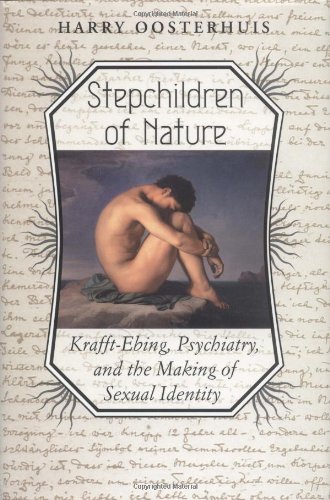Items related to Stepchildren of Nature: Krafft-Ebing, Psychiatry, and...
Stepchildren of Nature: Krafft-Ebing, Psychiatry, and the Making of Sexual Identity (The Chicago Series on Sexuality, History, and Society) - Hardcover

Synopsis
Psychiatrist Richard von Krafft-Ebing (1840-1902) played a key role in the construction of the modern concept of sexuality. As the author of the famous Psychopathia sexualis, he named and classified virtually all nonprocreative sexualities, synthesizing knowledge on sadism, masochism, fetishism, homosexuality, and exhibitionism. His influence on the study of sexuality cannot be overstated, but it is often misunderstood. In the wake of Michel Foucault's influential sexual histories, Krafft-Ebing is often maligned as a contributor to the repressed Victorian construction of sexual deviancy.
But in this powerful new cultural history Harry Oosterhuis invites us to reconsider the quality and extent of Krafft-Ebing's influence. Revisiting the case studies on which Krafft-Ebing based his findings, and thus drawing on the voices of his patients and informants, Oosterhuis finds that Krafft-Ebing was not the harsh judge of perversions that we think he was. He argues that Krafft-Ebing had a deep appreciation of the psyche, and that his work reveals an attempt to separate sexual deviancies from ideas of immorality. In the tradition of Freud, then, Krafft-Ebing should stand not as a villain, but as a contributor to more modern notions of sexual identity.
"synopsis" may belong to another edition of this title.
About the Author
Harry Oosterhuis teaches history at the University of Maastricht. He is the author of Homosexuality and Male Bonding in Pre-Nazi Germany and the coauthor of Gay Men and the Sexual History of the Political Left.
From Library Journal
The legacy of Viennese psychiatrist Krafft-Ebing (1840-1902) rests largely on his well-known Psychopathia Sexualis, a collection of case studies and an attempt to classify sexual "deviance" systematically. From the early 20th century to the rabid denunciations of Michel Foucault and others in the 1980s, Krafft-Ebing's work has been harshly criticized as everything from morally repugnant to blatantly serving the interests of psychology's medical model proponents. In this first published attempt at an intellectual biography of the controversial figure, Oosterhuis (history, Univ. of Maastricht) examines the emergence of sexual science as Krafft-Ebing was entering psychiatry, his attempts at classifying certain types of sexuality within psychiatry, and an analysis of several case studies, among other topics. This well-researched book goes beyond the misperceptions that have been perpetuated by taking his work out of historical context. Recommended for larger public and all academic libraries.DDavid Valencia, King Cty. Lib. Syst., Federal Way, WA
Copyright 2001 Reed Business Information, Inc.
"About this title" may belong to another edition of this title.
- PublisherUniversity of Chicago Press
- Publication date2000
- ISBN 10 0226630595
- ISBN 13 9780226630595
- BindingHardcover
- LanguageEnglish
- Edition number1
- Number of pages304
- Rating
Shipping:
US$ 3.99
Within U.S.A.
Search results for Stepchildren of Nature: Krafft-Ebing, Psychiatry, and...
Stepchildren of Nature: Krafft-Ebing, Psychiatry, and the Making of Sexual Identity (The Chicago Series on Sexuality, History, and Society)
Seller: Losaw Service, Lenox Dale, MA, U.S.A.
Soft cover. Condition: Good. 1st Edition. Softcover ARC. Some shelf wear. Pages have a few minor pen marks, tight binding. Seller Inventory # J493
Quantity: 1 available
Stepchildren of Nature : Krafft-Ebing, Psychiatry, and the Making of Sexual Identity
Seller: Better World Books, Mishawaka, IN, U.S.A.
Condition: Good. Former library book; may include library markings. Used book that is in clean, average condition without any missing pages. Seller Inventory # GRP63953820
Quantity: 1 available
Stepchildren of Nature, Krafft-Ebing, Psychiatry, and the Meaning of Sexual Identity
Seller: Frank Martignon Bookseller, Atlanta, GA, GA, U.S.A.
Hardcover. Condition: New. Dust Jacket Condition: Fine. 1st Edition. A volume in the Chicago series on sexuality, history, and society. Revisits the case studies on which Krafft-Ebing based his findings. 18 b&w illustrations. x, 321 pp. Bibliography. Index. Fine Hardcover in full cloth w/ Fine dj. Size: 8vo. Seller Inventory # 1278
Quantity: 1 available
Stepchildren of Nature: Krafft-Ebing, Psychiatry, and the Making of Sexual Identity (The Chicago Series on Sexuality, History, and Society)
Seller: BennettBooksLtd, North Las Vegas, NV, U.S.A.
hardcover. Condition: New. In shrink wrap. Looks like an interesting title! Seller Inventory # Q-0226630595
Quantity: 1 available
